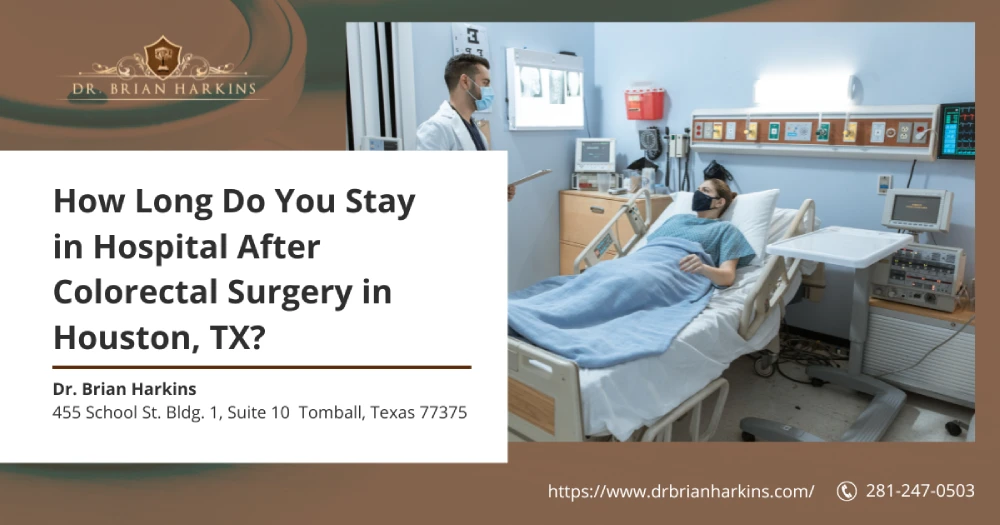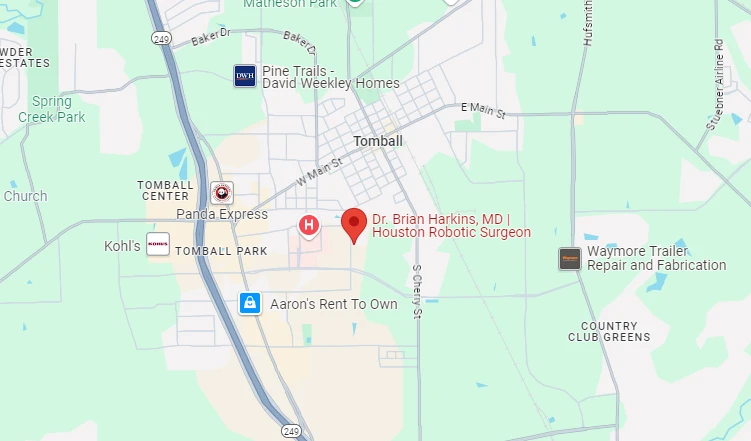
After colorectal surgery in Houston, TX, most patients stay in the hospital for 2 – 5 days, although some people with simpler minimally invasive procedures such as laparoscopic colon surgery or robotic surgery go home in as little as 2 to 3 days. So, how long do you stay in hospital after colorectal surgery in Houston, TX? The answer depends on several factors: your exact length of stay depends on the type of surgery, whether it is an open colon surgery or a colectomy for colon cancer, and how quickly your bowel wakes up after anesthesia. This comprehensive guide explains what happens in the first 24 hours after surgery, outlines key recovery milestones, and answers the most frequently asked questions from patients concerned about their digestive health and time away from work or family.
Different types of surgery are used to treat diseases of the large intestine and rectum. For example, a robotic low-anterior resection for rectal cancer usually means less tissue trauma than an open abdominoperineal excision, so patients are usually discharged sooner. Your surgeon will recommend the best treatment options—open, laparoscopic, or robotic—based on tumor size, location, and overall health. Each method is used to treat rectal cancer, polyps, diverticulitis, or inflammatory bowel disease.
Conditions like COPD, heart disease, or poorly controlled diabetes can extend your hospital stay. A skilled colon and rectal cancer surgeon will coordinate with cardiology, pulmonology, and anesthesia teams to optimize comorbidities before the operation, helping you go home sooner.
The first 24 hours after surgery set the tone for recovery. Modern Houston programs emphasize carbohydrate drinks two hours pre-op, opioid-sparing pain control, and early ambulation. Research shows these measures reduce complications, improve digestive tract and needs, and let many patients leave the hospital after only 2 to 3 days.
| Hospital Day | Typical Goals | Common Activities | Discharge Likelihood |
|---|---|---|---|
| Day 0 (Surgery) | Wake up safely; manage pain | PACU monitoring; deep breathing; small incision checks | ✘ |
| Day 1 | Sit up and walk | Clear liquids; incentive spirometry; discuss risks and complications | ✘ |
| Day 2 | Advance to soft diet; pass gas | Remove Foley; longer walks; adjust pain medication | Possible |
| Day 3 | Bowel movement; oral meds only | Shower; review colostomy or ostomy bag care if needed | Likely |
| Day 4-5 | Independent mobility; stable vitals | Lab checks; finalize home services you may need | Very likely |
Some operations require the surgeon to create a temporary or permanent colostomy. You’ll meet an enterostomal nurse who shows you how a plastic bag that collects waste—commonly called a colostomy bag—fits over the stoma. Patients are usually comfortable changing the bag after surgery by Day 3.
Moving within six hours reduces clot formation. Aim for 800 + steps by Day 3 to restart the bowel movement cycle and encourage faster re-entry of food through the digestive tract.
Chewing sugar-free gum mimics eating, helping your large intestine resume peristalsis. Sip electrolyte drinks and follow the recommended diet for the next several days—usually low-fiber and low-fat—until your surgeon removes diet restrictions.
Report fever, worsening pain, or unusual stool color. Prompt attention to small issues prevents major risks and complications that could extend your hospital stay or require readmission.
Most patients transition to acetaminophen and NSAIDs by one week post-op. Opioids should be used sparingly to prevent constipation, a common problem in the days following surgery.
Keep incisions dry for 48 hours, then gently wash. Watch for redness or pus around the anal or abdominal site. Call your surgeon if you see changes—early detection avoids extra hospital time.
You’ll see your Houston team 7-10 days post-discharge. Telehealth visits are available through the young-onset colorectal cancer program for adolescent and young adult oncology patients who may live far from the Texas Medical Center.
Most patients stay 2 to 5 days in the hospital, depending on the surgical method (open vs. minimally invasive), overall health, and how fast the bowel function returns. Enhanced recovery programs in Houston help many go home by Day 3 with proper monitoring and support.
Not always. A permanent or temporary colostomy is required only if a safe join cannot be made in the part of the rectum or colon. Your cancer treatment plan will outline whether you’ll need an ostomy bag and how long you might keep it.
The first two days focus on stabilizing vitals, restarting bowel function, and pain control. Nurses will encourage breathing exercises, early walking, and sipping clear liquids. This window is crucial for identifying any early risks and complications before patients go home.
Certain selected cases of benign disease allow same-day discharge, but most bowel resection can be done safely with an overnight stay to monitor for bleeding or leaks. Cancer cases typically require at least 2 – 3 days in hospital.
Key concerns are anastomotic leak, bleeding, ileus (a sleepy bowel), and infection at the incision site. Early detection through labs and physical exam lets the team intervene before complications prolong the hospital after surgery period.
The young adult oncology program offers fertility counseling, peer support, and tailored nutrition plans. These services ensure younger patients receive age-appropriate resources alongside advanced cancer surgery like robotics or laparoscopic excision.
Most surgeons recommend low-fiber, low-fat foods—think yogurt, eggs, and soft vegetables—for the first week. Gradually add fiber after your first solid bowel movement. Hydration and small, frequent meals protect your healing digestive tract and needs.
For cancer patient received chemotherapy pre-op, post-operative therapy generally restarts 4-6 weeks later, once wounds heal and lab values normalize. Your oncologist coordinates timing so that cancer patients face minimal delays in overall treatment.
The team uses a multimodal approach—acetaminophen, NSAIDs, nerve blocks, and limited opioids. Stool softeners and early walking reduce constipation. Inform your nurse if stool hasn’t passed within 72 hours so adjustments can be made.
You might require home nursing for wound checks, physical therapy to regain strength, or dietary counseling for digestive health. Social workers help arrange supplies such as an ostomy bag or walker, ensuring a smooth transition once patients stay in the hospital is over.


Dr. Brian Harkins is a renowned surgeon specializing in advanced, minimally invasive, and robotic surgical techniques. With a dedication to innovation and personalized patient care, he has transformed countless lives by delivering exceptional outcomes.

I want a website like this, where do i start?